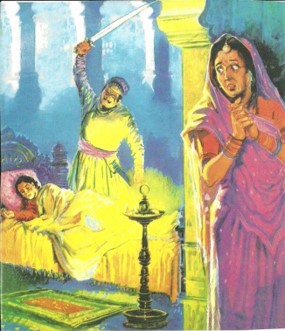Talk:Patriotism of Pannā Dhāī
By Vishal Agarwal
After the death of the Mahārāṇā Ratan Siṅgh II of Mewār in 1527 C.E., he was succeeded on the throne by the crown prince Vikramāditya. But he proved incompetent for kingship as he was very hot-tempered. Therefore, the Rājpūt chiefs appointed the younger prince Udayasiṅgh as the ruler. However, as Udayasiṅgh was a minor, a chief named Bānvīr was appointed as the regent. Bānvīr soon became ambitious and started dreaming of becoming the king of Mewār himself. One night, he entered the room of prince Vikramāditya while he was sleeping and beheaded him.
The word soon reached Pannā Dhāī, who was the nursemaid of Udayasiṅgh. Her own son Candan was also a minor and of the same age as Udayasiṅgh. She promptly put prince Udayasiṅgh’s clothes on her own son, and asked for Udayasiṅgh to be hidden in a basket. Then, she placed her own son wearing Udayasiṅgh’s clothes on the prince’s bed. She asked a loyal royal servant to take the basket to the banks of a river close by and wait for her.
When Bānvīr entered prince Udayasiṅgh’s room, he mistook Candan for the prince and beheaded him. Pannā Dhāī sobbed silently as she saw her son killed. She lifted his beheaded body and placed it in another basket. At the river, she immersed her dead son’s body and ran away with prince Udayasiṅgh.
By sacrificing her own son, she saved the life of the future ruler Udayasiṅgh. She carried the prince from town to town till they were provided refuge by a rich merchant. After several years, when the prince grew secretly to be a strong teenager, the Rājpūt chiefs discovered him. There was a battle in which the population of Mewār supported prince Udayasiṅgh. Bānvīr was defeated and was never heard of again. Prince Udayasiṅgh became the next Mahārāṇā of Mewār in 1540 C.E. and also founded the city of Udaipur, famous for its palaces in India today.

